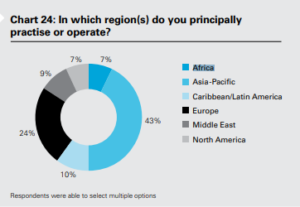Queen Mary University of London and White & Case have just published the results of their 12th International Arbitration Survey. For those of you in the field, you’ll know that this is the preeminent empirical study on arbitration. As a Team, we have consistently found the Surveys particularly insightful, and have enjoyed that they pick a theme so as to focus on current issues. This year’s theme was “Adapting Arbitration to a Changing World” – very appropriate given the roller coaster ride we have been through in the past 15 months. While the laws and rules have largely remained the same, the practice of arbitration has seen a drastic change during this time.
These are some of our key takeaways from this year’s Survey:
- The Age of Asian Arbitration is well and truly upon us. In this year’s Survey, 43% of Survey respondents stated that they principally operate in Asia-Pacific. This is up from 25% in 2018. This is the largest portion of the pie by a significant margin:

Source: QMUL International Arbitration Survey 2021
- The top three most preferred seats of London, Singapore and Hong Kong happen to be our Team’s busiest arbitration centres, together with Beijing and Sydney. To us, the edge these seats have are excellent arbitration institutes and no-nonsense arbitration-friendly judiciaries. Each of the HKIAC, SIAC, LCIA, and the ICC ensure their rules are constantly updated to reflect the latest arbitration practices, and their respective secretariats make arbitration as smooth as possible.
- Clients love technology! A whopping 79% of Survey respondents would choose to proceed with a virtual hearing, rather than postponing a hearing, and 72% said they sometimes, frequently or always use virtual hearing rooms. As soon as the pandemic hit, our Team overhauled how we do arbitration. We started with holding nearly all procedural hearings virtually, and we now regularly do full length substantive hearings virtually, even those involving extensive cross-examination and even where witness credibility is a key issue between the parties. There are certain situations where an in-person hearing is still preferable, but virtual hearings get much fuller consideration now than they ever did before. In many cases, this has worked out better than in-person hearings, and in virtually every case, it has worked out much cheaper. In our experience, the technology works, but it is important to ensure the technology provider is top notch and that the parties and the Tribunal have contingencies for when things don’t go to plan.
- Page limited written submissions. Clients support page limited briefs, and we think we will see more Tribunals ordering page limits in an attempt to increase efficiency and reduce legal costs.
The silver lining of restricted travel over the past year has been an unavoidable impetus to optimise and adapt businesses globally. Arbitration has been no exception. While we are very much looking forward to seeing the tail-end of the pandemic, we are happy to see and be part of the changes that have been made for the better in the practice of arbitration.






